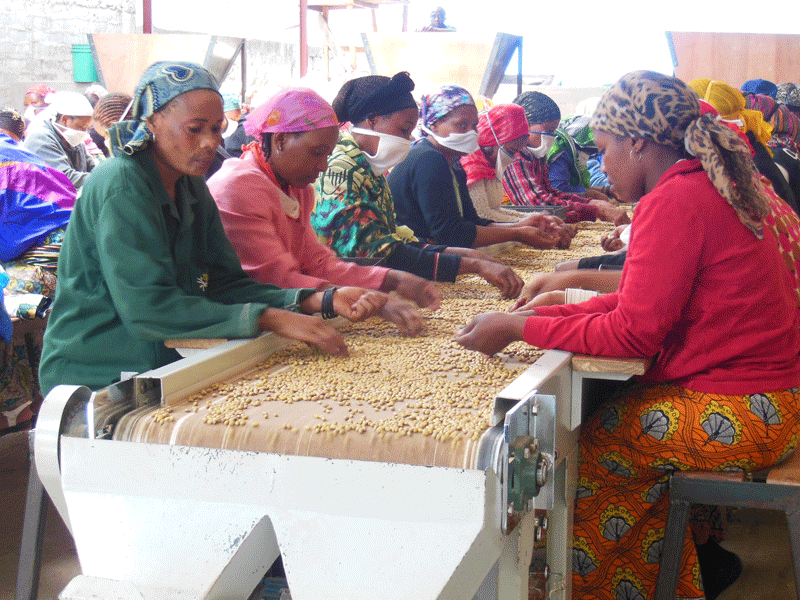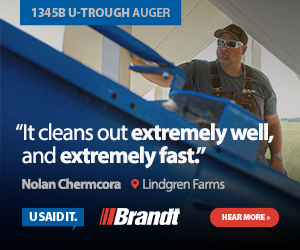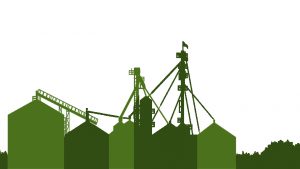Quality Food Products
MAKING A DIFFERENCE IN TANZANIA
THE UNITED REPUBLIC of Tanzania is home to 91 million acres of arable land, of which only 25 million are under cultivation. An important part of the economy, the agricultural sector supports 80 per cent of the Tanzanian population. Farmers, though, struggle with low productivity per acre and high cost of production.

Farmers cultivate small pieces of land using manual labour and traditional farm implements, making expansion essentially impossible. Limited access to credit, mechanization, and inputs mean low yields are commonplace, making it impossible for Tanzanian farmers to compete not only locally, but also on an international level. Quality Food Products Limited (QFP) is working to change that.
Based in northern Tanzania, in the city of Arusha, QFP is an innovative agribusiness that offers a variety of farmer services, including access to credit, quality inputs, and mechanization. QFP also provides marketing services for its clients. It contracts farmers to produce crops, such as maize and beans, with the contracts clearly stating the price of each crop QFP purchases and the prices of the inputs they can provide.
“Each farmer has an individual account with the company and the harvest of each farmer is entered in the account and balance paid out in cash,” explains Ekko Oosterhuis, QFP CEO and founder. “With an off take contract from our company, farmers can now go to the bank to access input finance for agricultural inputs against agreed budgets.”
CONSERVATION
QFP doesn’t just help farmers financially — the company teaches them better farming practices, enabling them to succeed. Oosterhuis has seen the advantage of conservation agriculture in dry-land farming, and access to mechanization plays an important role in the practice.
“In the drier areas, conservation tillage helps to preserve moisture,” explains Oosterhuis. “In higher rainfall areas, conservation agriculture helps to preserve soil nutrients. It’s all about looking after the soil so that the plants have a better growing environment and produce more efficiently.”
Soil compaction, due to rainfall and roaming cattle, makes strip tillage the perfect answer for smallholder farmers. It’s just not feasible for farmers to switch directly from conventional tillage to conservation tillage immediately, since the switch negatively impacts yields.
“Farmers working with us, and adopting the principles of conservation tillage and crop rotation, are seeing the differences in yield and gross returns and are sticking to our introduced concept,” says Oosterhuis. The farmers who adopt conservation farming practices are guaranteed a 50 per cent increase in their crop yields at minimum.
QFP offers farmer training sessions and organizes field days where growers can see first-hand the impact of different practices. Farmers learn the impact of crop rotation and observe field trials in a number of locations. They are taught how to measure different parameters such as rainfall, soil compaction, actual yield per acre, and soil pH.
COOPERATION
Since 2014, QFP has collaborated with various partners, both public and private. The Maize Public Private Partnership (PPP) aims to commercialize food security in Tanzania through mechanization.
“Maize is a very good rotation crop for us, so we’re very happy with this cooperation with the PPP to faster invest in maize handling equipment,” says Oosterhuis. “We find that the problems the farmers get when they grow more than ten or 20 acres is often harvesting and drying the maize, so we’re now investing in harvesters and dryers so that the farmers can also grow up to 50 or 100 acres without problems on the harvesting side.”
When Bakari Daudi first started farming in Lolkisale village, he grew beans on just 10 acres of land. Since working with QFP, he has been able to expand his production to include maize. Daudi has now been working with QFP for 10 years. Today, he farms about 280 acres — all under contract with QFP — and has increased yields 500 per cent.
“Last year he produced 200 tonnes of maize from 40 hectares [approximately 100 acres] with an average yield of five tonnes per hectare, which is good for this area,” says Oosterhuis. “The average yield for farmers in Tanzania is less than one tonne per hectare.”
With the returns from last year’s maize and bean crop, Daudi was able to put a 50 per cent deposit on a new 90 Hp John Deere tractor. The other 50 per cent was paid by QFP. This year, Daudi planted his acres of beans with his own tractor and a hired planter from QFP.
Although its focus is on helping farmers, QFP has also helped improve the local economy as well by providing employment for women in its Arusha-based processing facility. There, crops including maize, beans, sunflower, and safflower, are processed for export. Beans are cleaned, hand sorted, and packed into 25 kilogram bags. Sunflower and safflower are crushed into oil and packed into 20,000-litre flexi-tanks. Maize is cleaned and packed in 90 kilogram bags.
The farmer has always been and will always be at the heart of QFP’s business. Those who have worked with the company have seen results. Under the PPP, 5,154 acres of maize were planted in 2014. Of that, 51 per cent was planted using QFP equipment and 2,519 acres were planted using QFP input and credit support. The expected yield for PPP farms is 1.6 tonnes/acre, which is an improvement over the national average of more than 300 per cent.
“The results are very good,” said Michael Mollel in a recent video interview. Mollel is a QFP and PPP farmer from Engasmet who farmed 800 acres in 2014.
“Even as you stand here, you see how the crop is,” he continues. “It is pleasing to the eye and healthy. This field hasn’t been weeded since spraying and planting to the stage it is at now. It has been a huge benefit. Something like this has never happened before.” •
























